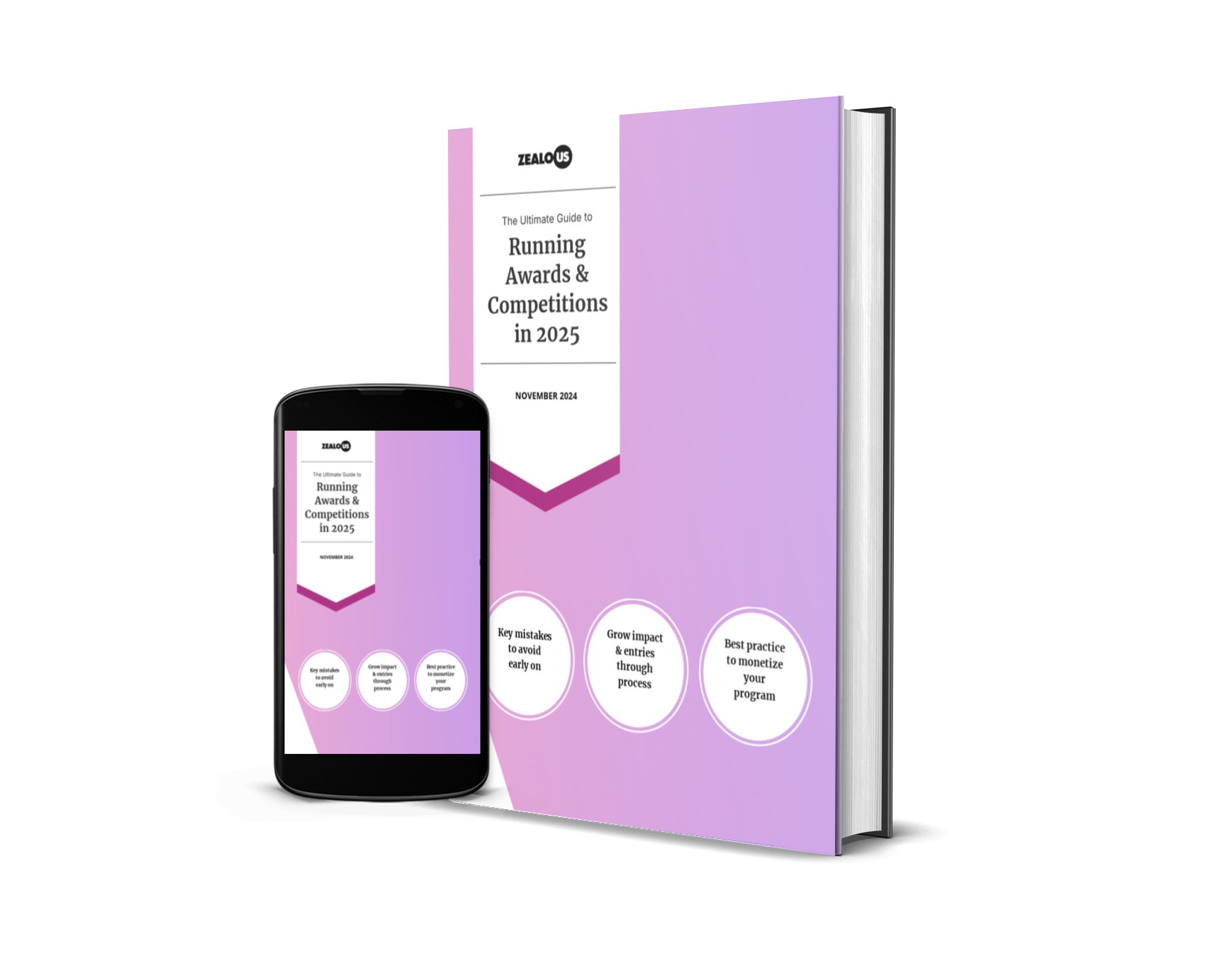This article covers:
- First impressions that establish immediate credibility
- Consistency that builds recognition across touchpoints
- Transparent selection processes that eliminate doubt
- Active transparency that answers questions proactively
- Communication strategies that make contact effortless
- Partnership choices that elevate your reputation
- Following through on commitments relentlessly
- Crisis communication that preserves relationships
- Strategic communication throughout your programme
- Post-submission transparency that builds loyalty
- The compound effect of trustworthiness
Brilliant awards programmes with generous prizes still fail. Not because candidates don’t exist. They fail because potential applicants may not trust the organisers enough to invest their time (some things can look too good to be true!)
Trust determines whether someone submits to your programme or scrolls past it. Every element of your awards process either builds confidence or chips away at it.
Your visual identity sets expectations
Quality imagery tells candidates what to expect before they read a single word.
If you’re running your programme for the second time, showcase high-resolution photos from your previous event. Winners accepting awards, work being displayed, judges engaged in selection – these images provide social proof that you deliver on promises.
First-time programmes need different approaches. Source professional imagery that matches your programme’s calibre, but verify usage rights thoroughly. A copyright dispute mid-campaign destroys credibility faster than poor imagery ever could.
Skip the Microsoft Paint aesthetic (unless you’re celebrating 80s kitsch – then run with it!). Text-heavy images resize poorly across platforms and signal amateur operation. Strong visual content captures attention so candidates read your copy. Save text for where it belongs: in descriptions that explain value.
First impression insight
Your imagery quality directly correlates with perceived programme quality. Candidates make judgments about your professionalism in under a second based purely on visual presentation.
Consistency builds recognition across touchpoints
Candidates rarely convert on first impression. They discover your programme through Instagram, investigate via your website, check your LinkedIn credibility, then decide whether to submit.
Each touchpoint either reinforces or undermines trust. Use identical programme titles everywhere. Maintain visual consistency with similar colour palettes and imagery. Keep your tone of voice recognisable whether someone encounters you on Twitter or reads your guidelines.
Dead social channels signal abandonment. If you haven’t posted in months, remove those social links from your website entirely. Better yet, delete inactive accounts so they don’t surface in searches. Active engagement demonstrates ongoing commitment to your community.
Transparent selection processes eliminate doubt
Candidates invest time submitting only when they believe everyone has equal opportunity to win.
State eligibility requirements explicitly. If your programme targets emerging artists under 30, say so upfront. If you’re region-specific or industry-focused, make it immediately clear. Candidates waste time applying to programmes they’re ineligible for, then blame organisers for poor communication.
Share your judging panel prominently. Names and credentials matter. If recognisable experts evaluate submissions, candidates know their work receives serious consideration.
Define your scoring criteria clearly. Candidates deserve to understand what makes a winning submission. Transparency here also helps judges evaluate consistently, which ultimately leads to fairer results.
Publish your timeline publicly. When do submissions close? When will winners be announced? How will results be communicated? These seem like basic details, but many programmes omit them entirely, creating unnecessary anxiety for applicants.
Some programmes increase transparency and engagement further through public voting components that give communities direct input.
Candidates invest time submitting only when they believe everyone has equal opportunity to win.
Download launch checklist
Never miss a critical step: 300+ tasks across 8 phases, from securing judges to winner announcement.
Active transparency answers questions before they’re asked
Documentation reduces friction throughout your submission process.
Detail your prizes completely. If winners receive magazine publication, specify readership numbers and audience demographics. Twenty art collectors carry different value than 20,000 students, depending on career goals. Let candidates self-assess fit. Defining compelling perks requires understanding what your target candidates actually value, not what you assume they want.
Make costs transparent before candidates invest time applying. Discovering a £1,200 participation fee after being selected generates justified outrage. Hidden costs get flagged as scams across social media, damaging your reputation permanently.
Include submission fees in your initial communications. Pricing strategies can balance revenue needs with accessibility, but secrecy about costs only breeds distrust. Clear, comprehensive guidelines eliminate ambiguity that creates unnecessary support queries. If there are additional expenses for selected candidates, state them clearly in guidelines.
Nothing erodes brand trust faster than surprise financial obligations.
Critical transparency warning
“Congratulations, you’ve won, that will be £1,200 please” destroys trust permanently. Nothing damages your brand more than a candidate flagging you as a scam across social media.
Make contact ridiculously easy
Hiding contact information signals you don’t want candidate questions.
Display your email address prominently. Contact forms feel impersonal and candidates rarely trust them. A dedicated email address for programme queries demonstrates availability and creates accountability.
Social media contact seems convenient but forces conversations into public view. Some candidates prefer discretion when discussing eligibility questions or clarifying submission requirements (and you might also appreciate some queries being asked behind closed doors!).
Respond to enquiries quickly. Same-day responses show you’re actively managing your programme. Delays suggest disorganisation or indifference, both of which discourage submission. If you’re out of office, setup an auto-reply letting people know when to expect a response.
Collect frequently asked questions as your deadline approaches. If multiple candidates ask identical questions, update your guidelines immediately. This reduces support burden and demonstrates you’re listening to your community. Archive these insights for improving future programmes.
Systems that auto-save responses and track which questions candidates ask most frequently help you spot gaps in your communications faster.
Strategic partnerships transfer credibility
Association with trusted names elevates your programme’s perceived value.
A single respected judge can legitimise an emerging awards programme. Established sponsors signal financial stability. Brand partnerships demonstrate you’re part of broader creative ecosystems.
When trusted figures trust you, that trust extends to candidates considering submission. This credibility daisy-chains through networks, reaching communities you couldn’t access through marketing alone.
Choose partnerships strategically. For rock star accountants in New Jersey (yes, they exist!), you need recognisable figures from that specific space. Generic celebrity doesn’t transfer to niche communities.
Due diligence matters here. If partners lose credibility later, association damages your reputation too. Approaching judges effectively requires understanding their reputation as much as their expertise.
Partnership visibility also matters. If your platform makes it difficult for judges to engage with submissions, their participation becomes purely ceremonial. Look for systems where judges can score entries from mobile devices, receive automated reminders, and collaborate without friction.
Partnership quality benchmark
Modern platforms should support judges with mobile-friendly interfaces and automated reminders. If judging requires complex desktop-only workflows, partners become ceremonial rather than engaged.
Want more articles like this?
Give this one a like
Follow through on commitments relentlessly
Obvious (but unfortunately frequently violated) deliver exactly what you promise.
Promised prizes must materialise as described. No substitutions, no delays, no excuses. But promises extend beyond prizes. Anticipating common award problems helps you avoid breaking commitments accidentally.
Moving announcement dates erodes trust. Changing judges mid-programme raises questions about process integrity. Altering selection criteria after submissions open feels like moving goalposts unfairly.
Stick to your plan rigorously. When circumstances force changes, communicate immediately with transparent explanations. People forgive honest problems. They don’t forgive discovering changes accidentally or through the grapevine.
Platforms that automatically track deadlines and send reminders help maintain timeline integrity. If you’re manually managing dates across spreadsheets and multiple communication tools, something will slip through eventually.
Crisis communication preserves relationships
Problems happen. Your response determines whether relationships survive.
Communicate changes the moment you know about them. Delayed announcements look like cover-ups even when they’re not. Explain what changed and why openly. Candidates appreciate honesty about challenges.
“We lost our sponsor so prizes changed” gets more grace than discovering changes through updated guidelines without explanation. Context lets candidates understand your position. Silence makes them assume the worst.
If technical issues prevent submissions, acknowledge them publicly and extend deadlines accordingly. Don’t pretend everything’s fine when candidates are struggling.
The platforms you use either support or sabotage crisis response. If your system goes down and you can’t export candidate contact details to communicate directly, you’ve lost control of your message. Choose systems where you maintain access to your data always.
Crisis communication tip
Platforms that let you launch immediately without mandatory onboarding delays prevent timeline crises when internal approvals get delayed. If you need to catch up quickly, flexible systems matter.
Strategic communication maintains engagement
Regular updates remind candidates you’re actively managing their submissions.
Share submission milestones publicly. “We’ve received 200 incredible entries” builds excitement and social proof. “Three days until deadline” creates urgency for procrastinators.
Highlight quality submissions (with permission) during your open period. This shows candidates what strong entries look like while celebrating participants publicly.
Announce new judges or prizes as they’re confirmed. These become additional marketing moments while demonstrating programme evolution.
Marketing throughout your programme lifecycle maintains momentum rather than concentrating all promotion at launch.
Automated updates work here, but only when they feel personal rather than robotic. Generic “submission received” emails do minimum duty. Messages that reference specific submission details or programme milestones feel more engaged.
Insights like these straight to your inbox
Receive weekly tips from our founder to grow your program’s impact; regardless of what tools you use.
Post-submission transparency builds long-term loyalty
Your relationship with candidates doesn’t end at deadline.
Update participants on judging progress without revealing specific results. “Judges are currently reviewing Round One submissions” tells candidates their work is being evaluated actively.
Announce winners publicly with appropriate celebration, but also acknowledge runners-up and participants. Everyone who submitted invested time in your programme.
Share how many applied, demographic information about participants, and aggregate insights about the selection process. This data helps candidates understand context and competition levels, while tracking the right metrics helps you improve future programmes systematically.
Commiseration emails to unsuccessful candidates can maintain relationships rather than burning them. Generic rejections waste this opportunity. Specific feedback, when possible, helps candidates improve for future submissions.
Meaningful engagement extends well beyond announcement day when you maintain relationships with all participants.
Trust is hard-won and easily lost. Every element of your submission management process either builds it or undermines it.
The compound effect of trustworthiness
Trust accumulates through hundreds of small interactions and consistent choices.
Present your programme identically across every platform where candidates encounter you. Define clear purpose and communicate it transparently. Explain selection processes completely before submissions open. Display all costs upfront.
Make yourself accessible for questions and respond promptly when candidates reach out. Choose partners who enhance your credibility. Deliver everything you promise on the timeline you committed to.
When problems emerge, communicate immediately with honest explanations.
These aren’t revolutionary strategies. They’re discipline and attention to detail consistently applied. Most programmes fail here not through malicious intent but through operational overwhelm.
Your technology choices either support or sabotage trust-building at scale. Systems that fragment your communications, hide your data, or create poor experiences for candidates work against you constantly. Understanding the tradeoffs between forms and dedicated platforms helps you make informed decisions about where to invest. Modern platforms should make trust-building automatic through transparent communications, intuitive experiences, and reliable delivery.
Trust is hard-won and easily lost. Every element of your submission management process either builds it or undermines it. There’s no neutral ground.
Quality benchmark
Modern platforms should offer flexible monthly pricing, not mandatory annual contracts that lock you in before you’ve proven your programme works.
We can help!
Zealous makes running your programmes easier
But we’re not alone in the space – here are 8 others you may wish to consider (even if we would prefer you choose us!).
Want us to write more content like this? Give it a like
Share

Guy Armitage is the founder of Zealous and author of “Everyone is Creative“. He is on a mission to amplify the world’s creative potential.
Frequently Asked Questions
How long does it take to build trust with potential award candidates?
Trust starts building with first impression and accumulates through every interaction. Your visual identity, clarity of communication, and response time to questions all contribute. First-time programmes benefit enormously from recognised judges or partners who transfer existing credibility. Established programmes can leverage testimonials from previous winners and transparent track records. Most candidates make trust decisions within their first two touchpoints with your programme, so clarity and professionalism must exist from the start.
Should I make my judging panel and selection criteria public?
Absolutely. Transparent judging processes significantly increase submission rates. Name your judges with credentials, explain scoring criteria clearly, and outline your selection timeline publicly. This transparency demonstrates fairness and gives candidates confidence their work receives legitimate evaluation. If your judges prefer anonymity during evaluation, explain that blind judging reduces bias while still sharing who ultimately selects winners.
What if I can’t afford expensive submission software?
Trust isn’t about expensive tools, it’s about consistent professionalism. Free tools combined carefully can work, but fragmentation shows. If candidates submit via one platform, pay through another, and receive communications from a third system, that disjointed experience raises questions. Modern awards platforms offer monthly subscriptions starting around £39-£48, which is less than the time you’ll spend manually coordinating free tools. Calculate whether your time coordinating systems costs more than integrated platforms. Systems that let you launch immediately, without mandatory onboarding delays that push back your timeline, provide additional value.
How detailed should I be about prizes and perks?
Extremely detailed. If prizes include publication, specify circulation numbers and reader demographics. If you’re offering exhibition space, share dimensions, location, typical footfall, and duration. For mentorship opportunities, name the mentors and time commitment. Vague prizes like “exposure” or “industry connections” sound hollow. Candidates evaluate opportunities based on specific value to their careers. The more concrete your prize descriptions, the easier candidates can assess fit and commit time to applying.
What’s the biggest trust mistake awards programmes make?
Hidden or surprise costs destroy trust fastest. Discovering participation fees, travel expenses, or material requirements after selection generates legitimate anger. Second biggest mistake is changing key elements (judges, prizes, deadlines, criteria) without transparent communication. Even when circumstances force changes, silence or inadequate explanation makes candidates assume dishonesty. Third common mistake is poor responsiveness – if candidates can’t reach you with questions or receive automated responses that don’t address their concerns, they assume you won’t support them if they win.
How can I prove my new programme is legitimate if I have no track record?
Partner strategically with recognised individuals or organisations in your field. A single respected judge provides enormous legitimacy. Detailed, professional communications signal serious intent. Transparent financials (where funding comes from, where submission fees go) demonstrate accountability. Never ask for money without explaining exactly how it’s used. First-year programmes can also offer optional submission fees or “pay what you can” models, reducing financial barriers while generating some revenue. If you’re associated with established organisations, make that connection explicit. Your personal credibility and the comprehensiveness of your planning documentation matter significantly when you lack historical proof.
Should I respond publicly to negative feedback or complaints?
Address legitimate concerns directly and publicly when possible, but move detailed resolution conversations private. Public acknowledgement shows you’re listening and responsive. “Thanks for flagging this, we’re looking into it” followed by actual investigation and fixes builds trust. Defensive responses or ignoring criticism suggests you don’t care about participant experience. If feedback reveals actual problems, fix them and communicate the fix publicly. If feedback is unfounded, politely clarify facts without attacking the person who raised concerns. Your response tells other potential candidates how you handle problems, which is often more important than the original issue.











